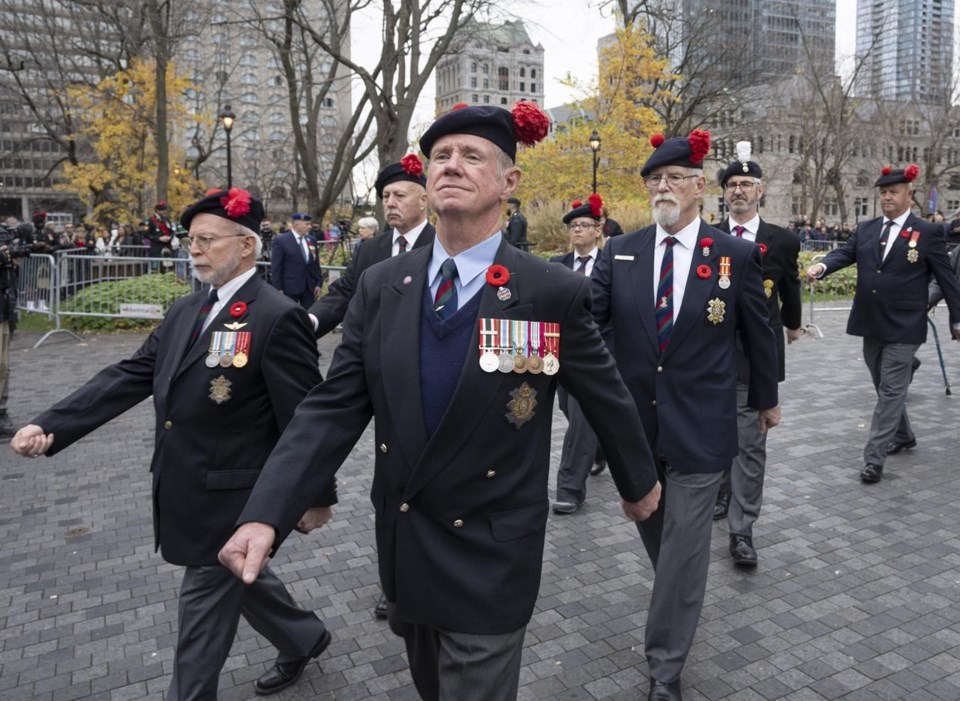OTTAWA — Case managers at Veterans Affairs Canada are warning that lives could be at stake as the government presses ahead with plans to change the way physical and mental rehabilitation services are provided to ill and injured ex-soldiers.
The warnings were delivered in emotional testimony before the House of Commons veterans affairs committee Monday, where three case managers said they and their clients were not ready for the planned changes.
“The unwell veteran is who we are going to lose and who will fall through the cracks,” Angela Aultman said as she fought back tears. “This is where lives are at stake. And this is what keeps me up at night.”
The issue revolves around a $570-million contract recently awarded to an outside organization, Partners in Canadian Veterans Rehabilitation Services, to provide physical and mental support services for Canada’s most at-risk veterans.
Veterans Affairs Minister Lawrence MacAulay and departmental officials have defended the contract as critical to improving services for former service members struggling with service-related injuries and illnesses.
That includes easing the burden on Veterans Affairs case managers, most of whom continue to struggle with excessive caseloads despite repeated promises from the Liberal government since 2015 to address the problem.
Even though the contract with PCVRS is scheduled to take effect Tuesday, the case managers told committee members that neither they nor their clients had been properly trained or prepared for the transition.
“Since June, we have asked questions about the implementation of the new contract only to be told that this information is forthcoming,” said Amanda Logan, who is also president of the Union of Veterans Affairs Employees local in Saint John, N.B.
“We have not been properly trained on this new rehabilitation contract. It is very challenging to know what to share with our veterans to prepare them for these changes when we do not know ourselves.”
All three case managers were testifying as members of UVAE, which has called for MacAulay’s resignation.
Retired master corporal Kelly Carter, one of 15,000 veterans currently working with a case manager to recover from his injuries and ease the transition to post-military life, testified that he was also in the dark about what the contract means for him.
“We have not been consulted at all on this change,” Carter said. “I am very deeply concerned that this has not been discussed, rolled out or implemented properly. And when the switch turns to 'on,' it may become an utter failure.”
The department has said it consulted with case managers before and after the contract with PCVRS was awarded, and that it will free them from some administrative tasks so they can spend more time working directly with veterans.
Officials have also said it will not lead to a reduction in the number of case managers employed by the department.
Veterans Affairs currently employs about 475 case managers. That includes around 50 who have been hired on temporary contracts to help reduce the overall caseload, and nearly 100 who are off on sick leave or otherwise not working.
The three case managers didn’t mince words as they discussed the large number of veterans assigned to them, with each stating that they are often forced to juggle 40 or more files despite repeated Liberal promises to reduce the average caseload to 25 to 1.
“With upwards of 40 files, our process becomes diluted and we are more susceptible to making mistakes,” Logan said.
“This has consequences on our health and well-being. Quite frankly, it keeps us up at night. We worry if something has been missed, and what kind of impact that could have on our veterans and their families.”
The employees also expressed concerns the new contract would lead to an eventual reduction in the role and number of case managers in the department while adding another layer of bureaucracy with which ill and injured veterans will have to contend.
“Privatizing these services will only serve to further isolate our veterans from their government, their community, and from the public service employees who have their best interests at heart,” said case manager Whitney McSheffery.
“I’m left with a feeling that the department is using this contract to further distance themselves from the veterans and their families.”
This report by The Canadian Press was first published Nov. 21, 2022.
Lee Berthiaume, The Canadian Press



